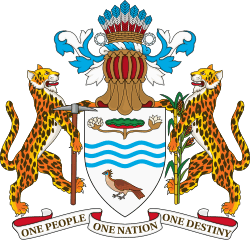Guyana–United States relations
Guyana–United States relations are the bilateral relations between the Co-operative Republic of Guyana and the United States of America.[1]
 | |
Guyana |
United States |
|---|---|
History
U.S. policy toward Guyana seeks to develop robust, sustainable democratic institutions, laws, and political practices; support economic growth and development; and promote stability and security. During the last years of his administration, President Hoyte sought to improve relations with the United States as part of a decision to move his country toward genuine political nonalignment. Relations also were improved by Hoyte's efforts to respect human rights, invite international observers for the 1992 elections, and reform electoral laws. The United States also welcomed the Hoyte government's economic reform and efforts, which stimulated investment and growth. The 1992 democratic elections and Guyana's reaffirmation of sound economic policies and respect for human rights have benefited U.S.-Guyanese relations. Under successive PPP governments, the United States and Guyana continued to improve relations. President Cheddi Jagan was committed to democracy, adopted more free market policies, and pursued sustainable development for Guyana's environment. President Jagdeo is continuing on that course, and the United States maintains positive relations with the current government.
In an effort to combat the spread of HIV/AIDS in The Co-operative Republic of Guyana, the U.S. Centers for Disease Control and Prevention (CDC) opened an office at the U.S. Embassy in 2002. In January 2003, The Cooperative Republic of Guyana was named as one of only two countries in the Western Hemisphere to be included in President Bush's Emergency Plan for AIDS Relief. CDC, in coordination with the U.S. Agency for International Development (USAID), is administering a 5-year multimillion-dollar program of education, prevention, and treatment for those infected and affected by the disease. The Cooperative Republic of Guyana was a threshold country in the Millennium Challenge Account developmental program.
U.S. military medical and engineering teams continue to conduct training exercises in Guyana, digging wells, building schools and clinics, and providing medical treatment.
Political activism inside Guyana
There is an active political party along a civil movement in Guyana that advocates deeper ties between the United States and Guyana, seeking to become a U.S. territory or entering its Commonwealth similar to Puerto Rico. Even a possible statehood has been formulated as an ultimate goal. Citing among many other factors the Guyanese emigration to the U.S. and the close ties that have emerged from it socially and economically an official internet presence was established and has been in operation for several years providing detailed information regarding emigration and other facts concerning the current Guyanese state.[2][3][4]
U.S. embassy officials
Principal U.S. Embassy Officials include:
- Ambassador - Sarah-Ann Lynch
- Deputy Chief of Mission: Terry Steers-Gonzalez
- Management Officer: James Grounds
- Political/Econ Chief: D. James Bjorkman
- Public Affairs Officer: Amanda Cauldwell
- Chief, Consular Affairs: Nazima Razick
- Regional Security Officer: William Noone
- HHS/CDC Country Director: Rachal Albalak
- Military Liaison Office Commander: LCDR. Michael A. White
- Peace Corps Country Director: Linda Arbogast
- USAID Country Director: Christopher Cushing
Diplomatic missions
The U.S. Embassy in Guyana is located in Georgetown.
See also
- Union of South American Nations
- Free Trade Area of the Americas
- Third Border Initiative
- Caribbean Community
- Caribbean Basin Initiative (CBI)
- Caribbean Basin Trade Partnership Act
- Western Hemisphere Travel Initiative
- Foreign relations of the United States
- Foreign relations of Guyana
- Jonestown
- Leo Ryan
References
-
Further reading
- Jacqueline A. McLeod, "Guyanese Americans." Gale Encyclopedia of Multicultural America, edited by Thomas Riggs, (3rd ed., vol. 2, Gale, 2014), pp. 293-303. online
- "GuyanaUSA". Guyanausa.org. Retrieved 14 October 2017.
- "Guyana to become a U.S territory – David Granger hints – News Daily TV". Newsdaily-tv.com. Retrieved 14 October 2017.
Further reading
- Lamur, Carlo. The American Takeover: Industrial Emergence and Alcoa's Expansion in Guyana and Surinam 1914-1921 (Brill, 1983).
- McLeod, Jacqueline A. "Guyanese Americans." Gale Encyclopedia of Multicultural America, edited by Thomas Riggs, (3rd ed., vol. 2, Gale, 2014), pp. 293-303. online
- Rose, Euclid A. Dependency and Socialism in the Modern Caribbean: Superpower Intervention in Guyana, Jamaica, and Grenada, 1970-1985 (Lexington Books, 2002).
![]()
External links
- History of Guyana - U.S. relations
- The United States Department of State – The Cooperative Republic of Guyana
- The Embassy of the United States of America
